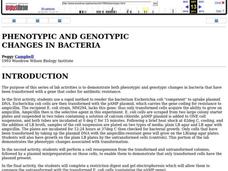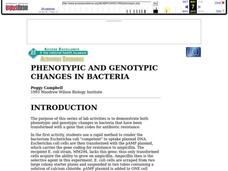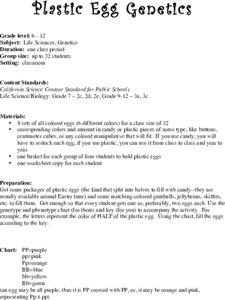Curated OER
Phenotypic and Genotypic Changes in Bacteria
Students investigate a rapid method to render the bacterium Escherichia coli "competent" to uptake plasmid DNA. They demonstrate the phenotypic changes associated with transformation. They perform a cell resuspension from the...
LABScI
Genetic Equilibrium: Human Diversity
Investigate the Hardy-Weinberg Principle to explain genetic equilibrium. The 10th lesson plan of a series of 12 is a laboratory exploration of genetic equilibrium. Your classes use a mixture of beans to model allele and genotype...
Curated OER
PHENOTYPIC AND GENOTYPIC CHANGES IN BACTERIA
Students use a rapid method to render the bacterium Escherichia coli "competent" in order to uptake plasmid DNA. They also have growth on the plain LB plates by the untransformed cells (which serve as controls). Students perform a cell...
Curated OER
Genetics Mendelian
Students explore genetic terms, the Law of Dominance and the contributions of Gregor Mendel. After discussing Mendel's lab and his pea plants students observe examples of a phenotype chart. Afterward, they conduct their own lab to...
Curated OER
The Electrophoresis of Human Hemoglobin
Students analyze different types of hemoglobin. They use the technique of agarose gel electrophoresis to separate human hemoglobin molecules according to their electrical charge, size, and/or shape. Students relate the migration of...
Curated OER
Plastic Egg Genetics
Students are introduced to the concepts of genetic dominance, recessiveness, related terms, Punnett Squares, etc.
Curated OER
"Chips" Off the Old Block?
Students study using analogies between common items or occurrences and science concepts. They use the analogy of cookie recipes to that of the DNA "recipes" for living things to help us explain more about mutations.






